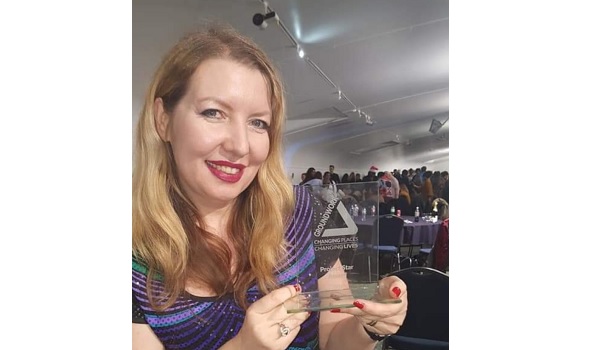'Dream beyond your situation': Irina's story
'Dream beyond your situation': Irina's story

Irina Bormotova's advice to refugees and asylum seekers is, “Do not limit yourself”.
One of her clients, a qualified accountant, reported being told by the Job Centre that he must do cleaning jobs because his English isn't good.
“I say ‘So what? We are going to register you on an English and accounting course. Dream beyond your situation. Don’t accept something if you think you deserve better.'”
Irina also came to Britain with poor English and without a specific career plan. John, her husband, had applied to study in London and she came with him from Moscow, Russia in 1996, pregnant with her second child. Once here – and finding she was unable to complete her Cambridge advanced English classes because of the lack of childcare support – she spent her time raising her children.
Living in her husband’s Ghanaian community in London she was introduced to volunteering.
“One day I was feeding my child. Heard a knock on the door and standing there was this exotically dressed beautiful black lady. She looked like an actress from an African movie.”
The woman, a community recruiter, helped Irina sign up for free training in business administration, which came with the support of childcare facilities.
This unexpected opportunity led to full-time employment and a Bachelor of Science in Career Guidance.
Now it seems her career, though not planned, has come full circle. Today she works with Groundwork Elevate, which offers free specialist advice to refugees preparing to work in the UK and supports businesses to employ refugees.
Theirs is a holistic care approach to supporting refugees. Most have issues with housing, accessing support from local authorities, opening a bank account, registering with a doctor and accessing English classes.
Irina’s role is sourcing and providing work experience, volunteering, training and employment opportunities for those interested.
She works not only with refugees but also people with discretionary leave to remain (DLR) and asylum seekers who have applied for permission to work.
She explains that even though asylum seekers have that option if they have been waiting for a decision for the Home Office for more than a year, they can only apply for jobs that are on a restrictive list and it’s very difficult to secure employment based on that list.
“There are so many things they have to go through before they are job ready,” says Irina.
“I think it is degrading that asylum seekers don’t have the right to work because they are keen on doing something. This affects them mentally. It’s very difficult to stay in a state of limbo doing absolutely nothing. It’s degrading. They have skills, they have education.
“Refugees suffer with mental health not only because of what they have been through in their past but also because of the Home Office process. They get stuck in a situation like being homeless. There are so many barriers they face before they can have access to employment or self-employment.”
But, she says, mental health problems do not have to limit a person. She recalls a client who was a successful businessman in Egypt before fleeing to the UK where he started struggling because of mental health difficulties. She supported him in finding his first paid job and referred him to an entrepreneurial network for refugees. Now he runs his own business.
Another success story is of an Eritrean woman wanting to work in tourism and travel. A work experience placement was arranged with a luxury travel agency and the woman was eventually offered the opportunity of being an independent travel advisor to the company.
“Her only issue is childcare,” says Irina. “It is difficult for women to move into successful self-employment because of childcare.”
Irina’s work ethic and determination seem to have rubbed off on her daughters. Her eldest works in property investment, her second for a bank in Manchester, and her third is in medical school. The youngest, at eight, is doing well in school.
Of her daughters’ mixed Ghanaian, Russian, British heritage, she says: “I think my children enjoy all cultures. My first three girls knew my parents before they passed away. They speak Russian – some more than others – Ghanaian and English. We are a diverse family and we are interested in different cultures.”
Though she has lived in the UK for over 20 years she is not confused about her identity: “I am Russian and I embrace British values. I like the tolerance of the society. I like the opportunities – you can do virtually anything here. If you work hard you can be really successful. UK is my home now.”
One day, she says, “I would love to manage the Elevate project and set up a social enterprise for refugees.”


